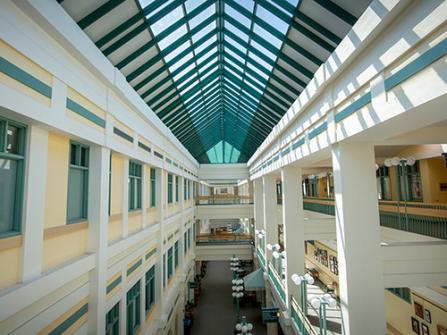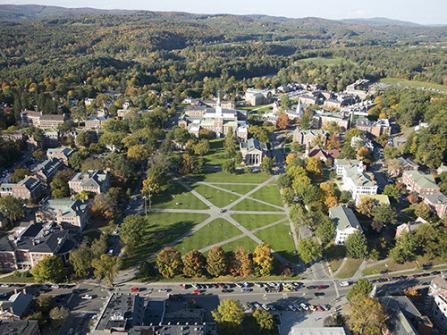Welcome to Dartmouth Hitchcock Medical Center
We have everything that you would expect a major academic center to have, from inpatient wards, outpatient clinics, to a cardiac Cath lab. Dartmouth Hitchcock Medical Center is a beautiful institution and provides a welcoming collegial atmosphere.
Learn more about GME at Dartmouth Hitchcock Medical Center
Program information
Mission statement
Our mission is to guide and educate physicians as they develop the skills and expertise to treat patients, and to support other physicians and technical staff in delivering optimal transfusion medicine-related care. The transfusion medicine physicians in training focus on the implementation of their knowledge in support of direct, and indirect, patient and donor care.
Program aims
To mold inquisitive fellows into transfusion medicine professionals who will go on to be national and international leaders in their field.
Program details
This ACGME-accredited fellowship is designed to provide a wide scope of experience in transfusion medicine, including hospital transfusion service with trauma level one support, a blood donor program, therapeutic apheresis, cellular therapy, HLA typing, and infectious disease testing.
Transfusion medicine is an unusual specialty in several respects: It combines both direct and indirect aspects of patient care, it cuts across the traditional divisions among medical disciplines, and it is practiced in settings as different as a community blood center and a hospital transfusion service.
Our program provides both a broad exposure to different experiences and ample opportunities to develop clinical, teaching and investigative skills.
Transfusion medicine physicians must have a thorough understanding of the technical and scientific basis of the discipline. They must also be able to translate this understanding into clinical problem-solving at the bedside. Therefore, an important part of this program is the involvement of the fellow in the care of patients, be they transfusion recipients, apheresis patients and formal and informal consultation at the bedside or in the operating room.
A second goal of the program is to train fellows to teach and lead. Although physicians' roles in formal teaching may be quite variable, a transfusion medicine physician is continuously involved in educating both technical staff (as an evolving field brings new techniques and concerns to the fore) and their fellow medical staff (in the form of consultation or the modification of transfusion practice). For this reason, the fellows in this program will be expected to take responsibility for some aspects of physician and non-physician teaching.
A third goal is to provide both the opportunity for and appropriate guidance in, developing an investigative project. The experience is not only valuable to those seeking academic careers; it helps all fellows critically assess new advances and understand the role of investigation in the field.
Faculty
Rotation schedule
Transfusion Medicine Rotations, 1 block = 4 weeks
Core I – 1 block
This rotation provides the fellow with an introduction to the operations of Transfusion Medicine Service and builds upon previous residency training to prepare him/her for taking direct responsibility for patient-and administrative decisions. The operation, and thus the orientation, includes Blood Bank (BB), Blood Donor Program (BDP), and Cellular Therapy Center (CTC). This rotation will have a significant amount of didactic activities as well as introduction to bench activities in the Blood Bank. At the conclusion of this rotation, the fellow should be intimately familiar with the daily operations, testing techniques, and capabilities of the entire operation.
Core II – 2 blocks
This rotation provides the fellow with additional interpretive and action capabilities in the following areas: daily operations, inventory; immunohematology laboratory; blood component utilization (as practiced at this institution); utilization of blood derivatives; operating room; intraoperative blood salvage, outpatient transfusions; donor and therapeutic apheresis procedures; hospital based donor center operation and decision making; unexpected antibody work-up; transfusion reaction investigation; teaching of a CP resident, hemophilia center interactions, and transfusion committee activities.
Core III – 4 blocks
The bulk of the fellowship is spent in this rotation where the fellow practices interventional and consultative transfusion medicine first alongside and then under the supervision of attendings (with increasing responsibilities). The fellow will serve as acting attending for as little as two weeks and as long as six weeks at the end of core III. The length of the acting attending term will be determined based on the faculty’s evaluation of the fellow.
Cellular Therapy - 0.5 block
This rotation exposes the fellow to activities related to cellular therapy, including procurement, processing and administration of cellular therapy products. It is expected that the fellow will spend some time on the BMT unit as well as in the cell processing laboratory.
HLA Tissue Typing – 0.5 block
This rotation consists of two parts. The first part is a one week immersion in molecular diagnostics with its new technologies. The second week will be devoted to exposure to HLA testing in a high volume laboratory with particular emphasis on the use of HLA typing in cellular therapy, platelet transfusion and organ procurement/transplantation.
Hematopathology/Coagulation – 0.5 block
This rotation encompasses exposure to special coagulation laboratory, flow cytometry, and general hematology testing. The purpose is to ensure that the fellow is cognizant of and comfortable with the testing performed in these laboratories so that he/she can appropriately apply the information in their practice. The fellow will be responsible for directing, managing and interpreting all work-ups requested during this rotation, in consultation with appropriate faculty.
Blood Donor Center/IDM Testing – 0.5 block
This rotation familiarizes the fellow with activities involved in blood collection at a large donor center including recruiting, mobile donations and donor screening. The fellow will be exposed to a large volume infectious disease testing for blood donors, including EIA, NAT, confirmatory testing and automated testing.
Research – 2 blocks
This rotation allows the fellow to pursue research projects and/or a specific area of interest.
Working at Dartmouth Hitchcock Medical Center
We offer benefits, including stipends, insurance, and assistance programs.
See also important/required GME policies to read prior to your interview:
Conferences
The Transfusion Medicine Fellow is expected to participate in conferences at least once a month and must give a minimum of two presentations per year. The fellow will be expected to give 2-4 lectures during the academic year on a medical, or technical, topic and is expected to present at TMS Rounds, CP didactic conferences and journal club/research conference.
| Conference | Frequency |
|---|---|
| CP Call Rounds/Quiz/Chalk | Weekly |
| BMT Program Meeting | Weekly |
| CP Seminar | Weekly |
| TMS Rounds | Weekly |
| Journal Club/Research Conference | Monthly |
| Pathology Grand Rounds | Monthly |
| Laboratory Management Seminar One-day | Seminar |
| Hematopathology Conference | Weekly |
| Clinical Hematology Meeting | Weekly |
| Medical Mortality Conference | Weekly |
Leadership Preventive Medicine Residency (LPMR)
- Builds on TDI strengths in outcomes research, improvement, population health and institutional commitment to quality, safety, and value
- MPH degree from TDI – tuition paid by program!
- Opportunity to lead change and improvement at Dartmouth Hitchcock Medical Center
- Two month governmental public health experience
- Dedicated faculty coach; teaching opportunities; unique multi-specialty resident/fellow/faculty group
- May incorporate research in one year of program (3 + 1)
- continue clinical work
- moonlighting allowed
- Graduates are in demand and employers are very interested in their mix of clinical skills plus improvement and change knowledge and experience
- Visit the LPMR web page, email tina.c.foster@hitchcock.org or contact an alum to learn more!
Contact us
Email:
elaine.r.danyew@hitchcock.org (Program Coordinator)
zbigniew.m.szczepiorkowski@hitchcock.org (Program Director)
Life in the Upper Valley
The Upper Connecticut River Valley area of central New Hampshire and Vermont includes the towns of Hanover and Lebanon, New Hampshire. Known as "The Upper Valley," this region attracts people from around the world for its scenic beauty.
The Upper Valley area offers a wide variety of cultural and recreational activities for people of all ages.

